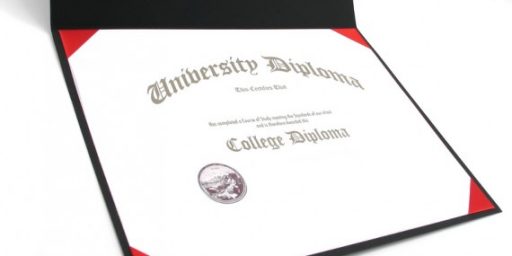Do You Really Need a College Degree for That Job?
In the current Atlantic Montly, Clive Crook argues that, contrary to conventional wisdom, sending everybody to college does very little for us at either the individual or societal levels.
In 2004, 67 percent of American high-school graduates went straight on to college, compared with just under half in 1972. This is widely applauded. It looks like progress—but is it really? Failing to go to college did not always mark people out as rejects, unfit for any kind of well-paid employment. But now, increasingly, it does. In a cruel paradox, this may be one reason why parental incomes better predict children’s incomes in the United States than they used to—in other words, one reason why America is becoming less meritocratic. A college degree has become an expensive passport to good employment, one for which drive and ability less often can substitute, yet one that looks unaffordable to many poor families.
Many occupations are suffering from chronic entry-requirement inflation. Hotels, for instance, used to appoint junior managers from among the more able, energetic, and presentable people on their support or service staff, and give them on-the-job training. Today, according to the Bureau of Labor Statistics, around 800 community and junior colleges offer two-year associate degrees in hotel management. In hotel chains, the norm now is to require a four-year bachelor’s or master’s degree in the discipline.
For countless other jobs that once required little or no formal academic training—preschool teacher, medical technician, dental hygienist, physical-therapy assistant, police officer, paralegal, librarian, auditor, surveyor, software engineer, financial manager, sales manager, and on and on—employers now look for a degree. In some of these instances, in some jurisdictions, the law requires one. All of these occupations are, or soon will be, closed to nongraduates. At the very least, some of the public and private investment in additional education needs to be questioned.
As one who spent not only nearly two decades attending college courses but several years teaching them, I largely agree with this assessment. A substantial number of jobs simply don’t require the skills obtained through a college education. More importantly, sending people who are ill-equipped and uninterested through the process — and then finding a way to keep them there through graduation because of the demands of the academic bean counters — is actually harmful.
Still, Emily Bazelon makes a rather strong argument today in Slate that one of the occupations on Crook’s list, preschool teacher, is better performed by those with college training.
Study after study shows that 3- and 4-year-olds are better served by more-educated teachers in myriad ways. As you might expect, these teachers tend to offer superior curricula and formal teaching. But they’re also, on average, “more stimulating, warm, and supportive” and “provide more age-appropriate experiences.” That finding is from a 2004 overview of the relevant research by the National Institute of Child Health and Human Development, and it represents the consensus view. The experts disagree over how much college coursework preschool teachers should have—a two-year associate degree vs. a four-year baccalaureate. The more vexing question is how to take what is now an underpaid, low-skilled workforce and magically restock it with college-educated professionals.
She adds substantially more insight, much of it anecdotal, to support her position. Ultimately, it depends what we want from preschool teachers: glorified babysitters or enrichment programs to prepare toddlers for grammar school. It’s hardly surprising that those bright and motivated enough to get through college are better at the latter.
I don’t know enough about many of the jobs on Crook’s list to know how much they require higher-order thinking skills vice more rote learning. The latter, certainly, can be done through on the job training. Regardless, it’s hard to see how exposure to English Literature would help a surveyor or dental hygienist.
It’s not a far stretch, however, to think that we would be better served if more of our police officers were college graduates. While physical courage, street smarts, and a sense of duty would be hard to impart in a classroom, one would think college would be an excellent place to teach decision-making skills and an understanding of law, the Constitution, and civil liberties. While there’s no doubt those things could be imparted at a police academy, a broader comprehension of these things would be more likely coming in an academic setting.
Any job requiring well rounded people with superior judgment would be better performed by college graduates. The Army has long recognized this fact, giving even junior enlisted soldiers whose duties allow them the luxury of time the opportunity to take subsidized college classes. A sizable percentage of senior NCOs now have at least an associate’s degree. The Army and our country are better served because of that.






If everyone had college degrees, that only serves to diminish the worth of such a degree. What we need more is quality vocational education that prepares students for the real world working place.
DCL:
We agree, I think. People working in factories or even highly skilled vocations like plumbers, electricians, and the like, don’t need college degrees.
It’s questionable as to whether the manager of a Wal-Mart or McDonald’s needs one, either–although perhaps it would be helpful to a general manager. Certainly, it would at levels higher up the ladder.
Some jobs that didn’t used to need college–say, nurses–may well these days simply because of the increasingly technical nature of the industry. I suppose one could divorce nursing school from a college–again, Lit and History are probably not all that useful–but you’d still have much of the overlay of a college education because of the need for a decent level of science training.
JJ – Vocational schools used to teach practical mathematics and such. Just look at what a machinist needs to operate a modern CNC machine – math (algegra or trig), computer science, machine design, etc. Good votech schools should and can teach these subjects if they relate to the duties required for people to enter the work force. We need these things to be taught at the junior and community college level, not at the four year schools.
It’s the prolonged adolescense industry
While we’re on the subject there are lots of jobs for which seniority is not particularly a qualification, either.
I would be interested in where you find colleges that teach decision making skills and an understanding of the civil liberties and law. What I see being taught in most of the colleges is far from that. They teach you how to hate your country and how to blame the US for daring to go against the LLL philosophy. They teach you some technical stuff but they do not teach you a grounding against which to plan what to do with the technical stuff.
I agree with DCL that most of what is needed could be taught in vocational classes. What is the possible use for gender specific classes and diversity classes, especially as majors. The days when the colleges and universities taught how to think logically are for the most part in the distant past. Good idea but the current execution does not pay.
If you want a high paying job with a high-school education come work for the U.S. Government. Hard work, determination, and education won’t get you anywhere, ass-kissing, sucking-up, and covering for the inept boss is how to move up. When I finish my degree I’m going back to the private sector.
Intersting post James. It never occurred to me that what we need to make this country greater is an even more ignorant population.
Is this serious? Have you ever seen the mess that bad programmers make? It takes tons of time and money to fix their crappy code.
I have 14 years experience training software developers in new technologies.
89.4% of jobs requiring degrees, could be performed without a degree! See i said that without a degree in statistical analysis![lol]